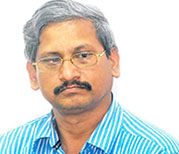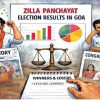Goa is abuzz with excitement as vintage bike and car owners, users, collectors and fans are decking […]

GOA IN DOCK FOR RIGGING STATE ELECTION COMMISSION!
Elections, Mar 20- Mar 26, 2021 March 19, 2021REFUSED: The Joint Chief Electoral Officer of the Central Election Commission Narayan Navti, declined the offer to become the State Election Commissioner as he did not qualify, because he has not completed the minimum of 20 years in the Goa Civil Service.
By Arvind Pinto
The Supreme Court has censured the Goa government for appointing the secretary to the Legal department, Chokha Ram Garg, as acting State Election Commissioner, in violation of all laws governing conduct of free and fair polls!
IT IS election time once again. Read the daily newspapers and you will find several pages of devoted to the forthcoming elections in West Bengal, Assam, Tamil Nadu, Kerala and Pondicherry. The antics of different political parties make headlines every day and political pundits sit to dissect each move that the leading contenders make; while bookies make a killing on the money that they rake in from the gullible public betting on the success or failure of one or other party.
But it is from the tiny state of Goa that a historic and far-reaching judicial pronouncement emanated. One by the Goa Bench of the Bombay High Court and the other by the Supreme Court in appeal that we have directions that will certainly affect the conduct of elections!
If elections are to be free and fair and without undue advantage to the government in power, the office of the Central and State Election Commissioners have to be an independent Constitutional authority as sanctioned by Article 324 of the Constitution. As per Article 324, the power of superintendence, direction and control of elections to Parliament, state legislatures, the office of president of India and the office of vice-president of India shall be vested in the Election Commission. The responsibility of elections in India from the highest post in the country, the president of the republic to the state legislatures is vested in this body.
GIFT TO LOYAL SERVANTS!
HOWEVER, for several years this institution has been a sinecure for retiring or retired government servants loyal to their political masters. All this changed when T N Seshan came along. Tirunellai Narayana Iyer Seshan was an Indian civil servant and bureaucrat who served with the Indian Administrative Service. For with TN Seshan as election commissioner, the Election Commission grew into a watchdog of the election process in the country; thereby, making political parties as also the people of the country aware of many of the malpractices that happened during this process. As chief election commissioner Seshan saw to it that the model code of conduct was taken seriously by political parties and candidates. After the legendary Seshan there were a few outstanding election commissioners, but unfortunately the body has now become another government body, willing to bend to the power at hand; unwilling to fulfil its role as envisaged in the Constitution as having the power of superintendence, direction and control of elections. Coming to the happenings at Goa. During the period of covid-19, the elections to the local bodies in Goa especially were postponed. Subsequently, these elections were notified by the State Election Commission
The Goa State Election Commission is a one-man commission consisting of the commissioner called Chief Electoral Officer (CEO) who is appointed by the governor under Article 243 K and 243 ZA of the Constitution of India read with Section 237 of the Goa Panchayat Raj Act, 1994 and Section l0A of the Goa Municipalities Act, 1968. Till date, the CEO was always a retired bureaucrat, always from the Indian Administrative Cadre. As the post was vacant, the law secretary, one Chokha Ram Garg, was holding additional charge.
FOR in Goa perhaps the chief electoral officer’s post is of little importance! In preparation for the civic elections to the five municipalities of Margao, Mapusa, Mormugoa, Sanguem and Quepem, the Director of Municipal Administration (DMA) had reallocated the reservation of wards in these municipalities. Further due weightage was not given to categories such as the women’s quota. Against this arbitrary delimitation made, and wrong categorisation, several writ petitions came to be filed in the High Court at Panaji.
Before the court the advocate general of Goa attempted to argue that since the elections were announced, the court should not stop the process. However, the court ruled that the action of the DMA was arbitrary and cancelled these orders issued by him, and directing the DMA to ensure that reservation for women is not less than one-third of the total number of seats reserved. The Court also directed the DMA give due weightage to their observations made in their order.
stay of order
When the advocate general asked for a stay of the order, the judges refused the same. Accordingly, the government of Goa carried the matter to the Supreme Court. If the government of Goa was hoping for a relief from the apex court, it was in for a shock. For the apex court not only confirmed the findings of the lower court but even went further. During the course of the arguments, the apex court found that the mandate of the Constitution has been flouted by giving the law secretary additional charge as chief electoral officer. The Supreme Court held that the additional charge given to the law secretary violates the Constitution as detailed in Article 243K. The Court decreed, that “all State Election Commissioners appointed under Article 243K in the length and breadth of India have to be independent persons who cannot be persons who are occupying a post or office under the Central or any State Government.”
If there are any such persons holding the post of state election commissioner in any other state, such persons must be asked forthwith to step down from such office and the State government concerned be bound to fulfil the constitutional mandate of Article 243K by appointing only independent persons to this high constitutional office.
The directions contained in this paragraph are issued under Article 142 of the Constitution of India so as to ensure that the constitutional mandate of an independent State Election Commission which is to conduct elections under Part IX and IXA of the Constitution be strictly followed in the future.
Thus, the court in the powers vested in it under Section 142 of the Constitution has mandated that there can only be independent persons as electoral officers and retired babus will no longer be entitled for these posts.
This far-reaching direction from the apex court has come at a time when the election commissioners have not lived up to their constitutional role of being watchdogs for the superintendence of elections. For many of them, this post has come as compensation for favours done to the ruling power during their administrative careers. Engrained with a culture of subservience to their political masters, these babus are unable to take independent decisions; which tends to give the ruling party an unfair advantage.
However, it is hoped that this seminal judgment of the Supreme Court will hopefully bring to these posts, persons of calibre, hopefully many more TN Seshans in future!
Goa like most states holds elections are regularly held. Goan elections are seldom challenged, since in many of these the winner is almost a foregone conclusion.
Elections have been conducted since the beginning of the republic from 1950. There have been several election commissioners Although a constitutional authority, the majority of them functioned as supernumerary government servants; which all of them were.
However, one recent election was challenged leading to certain important directions being given by the apex court that would determine the future of the highest election authority the Election Commission of India.
The elections to the municipal corporations in several towns of Goa, mainly Mapusa and Margao were postponed on the orders of the Goa Bench of the Bombay High Court. Recently, notices were served for postponed election to the civic councils.
(Arvind Pinto is retired as a Chief Income-Tax Commissioner and is now Standing Counsel for the IT Department in the Bombay)
HighCourt)














